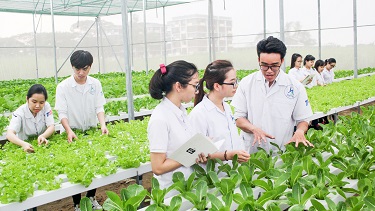Genomic Research Institute and Seed (GRIS)

1. Introduction
The institute was established in September 2018, initially implementing a plan to build a plant breeding research institute, with modern laboratories and equipment, especially the system of net houses and greenhouses for high-tech research.
Initially focusing on investing equipment for 4 key laboratories (Laboratory of genetic and plant breeding, Laboratory of physical and biochemistry, Laboratory of seed science and technology, Laboratory of plant tissue culture and Greenhouse, and next house)
Currently, The GRIS is focusing on the main features as follows
- Developing rice varieties adapted to global climate change
- Gathering and conserving genetic resources for breeding
- Researching and creating a few nutritious biphoorcair vegetables to protect human health
2. Research results for breeding selection in 2018-2019
- Effect of Lactic Acid on α-Amylase Activity and Phytic Acid Content in Germination of Rice (Oryza sativa)".
- Inhibitory Effects of Bamboo Leaf on the Growth of Pyricularia grisea Fungus
- Study on rice breeding resistant to Brown Planthoper (Nilaparvata lugensStål) in Mekong Delta, Vietnam
- Marker- Assisted Backcross screening for Vietnamese aromatic rice lines derived from TLR7/KhaoDawkMali105//TLR7
- Screening of Rice Germplasms under Salt Stress by Phenotypic and Molecular Markers
- Evaluation of Rice Backcross Populations for Salt Tolerance Using Phenotypic Analysis
- Evaluation of Enzyme Protease Activity and Inhibition Effect on Pyricularia grisea with the Leaf Extract of Commela communis
3. Research Collaborations
- High Agricultural Technology Research Institute for Mekong Delta
- British Council project on DEVELOPMENT ABIOTIC STRESS TOLERANCE IN RICE
- International cooperation: Dr. Mahesh Rao; ICAR-National Institute for Plant Biotechnology (NIPB) Pusa Campus, New Delhi-110012
4. Projects in the deploying progress
Project: Development of salt-tolerant rice varieties through molecular marker selection and dissemination in affected areas of saline conditions in the Mekong Delta, Vietnam
Chairman and Team Leader: Dr. Pham Thi Thu Ha
Organization: Genomic Research Institute and Seed (GRIS) – Ton Duc Thang University
Collaborating with scientists and High Agricultural Technology Research Institute for Mekong Delta (Mr. Nguyen Trong Phuoc, Mr. Tran Bao Toan, Mr. Bui Chi Cong, Ms. Nguyen Thi Hong Loan, Ms. Tran Thi Phuong)
Collaborating with scientists and IRRIs (Abdelbagi M. Ismail, IRRI, Glen, Russell Reinke)
The project is in the process of implementing the proposed 690,300 USD
5. Leaders
Deputy Director: Dr. Pham Thi Thu Ha, Doctor of Agriculture with a specialization in Genetics and breeding from Hiroshima University, Japan
Having worked at Cuu Long Delta Rice Research Institute from 2006-2018 with a specialization in plant breeding, currently working at Ton Duc Thang University
Being an author and co-author of more than 50 research projects in which more than 20 ones are published on national and international conferences.
Some varieties are developed and improved to adapt well to different ecological environments. Rice varieties are approved such as OM6600 (national varieties are registered for 20 years protection), OM11267 (MNR1), OM11271 (MNR5) OM7398, OM10041, OM7345, OM10252, OM10375 and OM8927. Commendation was awarded by the Prime Minister in 2014
Joining the research team with the task of breeding the hybrid population to serve the development of genetic maps of abiotic stress tolerance traits such as: rice being resistant to heat, salinity, drought and phosphorus shortage, biological stress resistance such as blast disease, brown plant hopper.
Participating in the rice breeding project for the Ministry of Agriculture and Rural Development (MARD) to finance export (2010-2015). Breeding program Developing technology to exploit the rice yield potential of CLRRI drought-affected areas (2010-2014). The project seeks to improve the soil and water productivity of rice-growing systems in salt-affected areas by integrating environmental and socially sustainable genetic management and improvement strategies. From 2007 to 2014, having attended the international project on climate change CLUES. Joining the project with Japanese funding (JIRCAS) to provide and develop single-gene lines for resistance to BLAST in rice in Southeast Asia. Attending to develop QTL for heat resistance in Korean cooperation rice.
6. Contact us
- Email: phamthithuha@tdtu.edu.vn